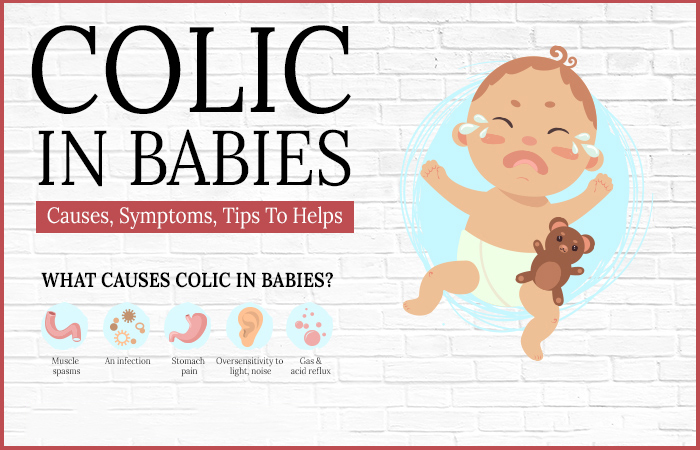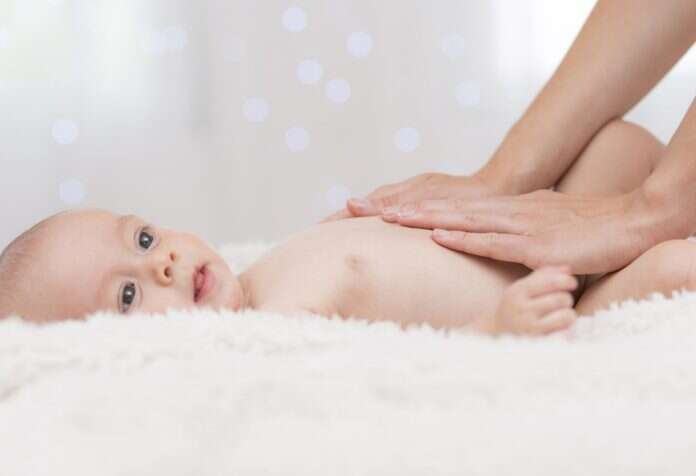COLIC PAIN MEANING
Colic refers to the excessive, frequent crying in a baby who appears to be otherwise healthy. This is seen in at least one in five babies.Colic tends to begin when a baby is a few weeks old and normally stops by four months of age. At the latest it is gone by six months. Colicky babies are usually fussy and difficult to calm.
In Ayurveda, pain in and around the navel is called colic. It is generally associated with constipation. In infants, the dhatu (body tissue) is still new and developing; also the agni (digestive fire) is low or mand. This means that they cannot digest everything that is eaten by the mother or the formula food that is given to them. Thus the mother has to be very careful about what she eats while she is breastfeeding. According to ayurveda, aggravation of vayu causes the colic pain.

CAUSES OF COLIC PAIN
Colic is usually caused by the distended gas that an infant has swallowed while feeding. It is suggested that the digestive system of the baby is still growing so it may lead to muscle spasms. Colic also develops due to hormonal changes or due to sensitivity to foods or to light and noise etc.
SYMPTOMS OF COLIC PAIN
Signs and symptoms of colic include:
- intense bouts of crying
- crying spells that start in the late afternoon or evening and lasts several hours
- the baby’s face becomes red and flushed as they cry
- while crying the baby clenches its fists and draws up their knees up to their tummy, or arch their back
- baby refuses to take feeds
- stomach may appear distended
- Pulls the legs near the abdomen
- crying stops on its own after some time
COLIC PAIN IN INFANTS AYURVEDIC TREATMENT
Most infants with colic eventually get better by the time they are 4- 6 months old. Unless there are serious signs or the baby stops crying after a few hours of feeding, there is nothing to worry.
Simple changes in diet and lifestyle and some herbs may help relieve the symptoms and prevent colic in children. Number of Ayurvedic herbs and formulas are effective to relive colic in children.
Also, at this condition we give medicine to mother because in infant they take mother’s milk and in some problem in milk due to colic pain in infants. This is one of the most important cause of pain.

DIET RECOMMENDATIONS (AAHAR)
- The mother’s diet while breastfeeding should be carefully chosen to avoid colic in the baby.
- The mother should have a diet as light as possible and easy to digest during this condition.
- Foods high in carbohydrates and starch should be avoided.
- Fried foods, spices and condiments should also not be taken.
- Fresh fruits and boiled vegetables and vegetable soup should form the major part of the diet. Fats should be avoided.
- Adequate amounts of water should be consumed.
- Breast feeding mothers should avoid too many milk products caffeine, onions, cabbage, beans, broccoli, and other gas-producing, irritating foods.
- If the baby is formula fed, a change in the brand may help ease the colic.
LIFESTYLE CHANGES (VIHAR)
Some of the tips to prevent and ease colic include –
- Feed the baby correctly to reduce gas ingestion
- Burp the baby after meals to remove the ingested gas and ease the colic
- Avoid anxiety or stress in mother
- Some babies seem to be soothed by rhythmic, steady movements, like rocking gently or by gentle sounds
- Baby massages and worm baths also help ease the colic

